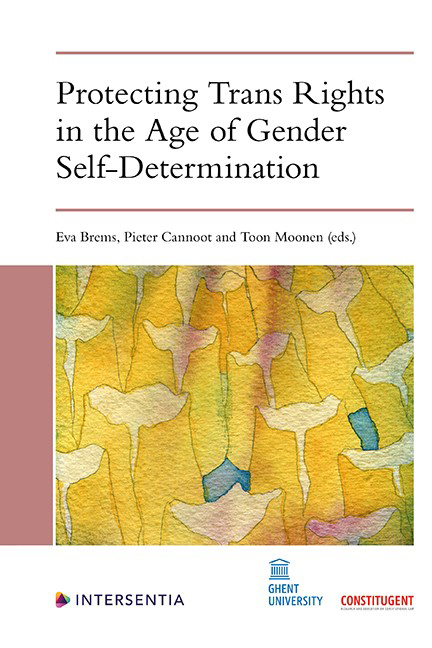Book contents
- Frontmatter
- Contents
- List of Cases
- List of Authors
- Introduction
- The Limits to Gender Self-Determination in a Stereotyped Legal System: Lessons from the Belgian Gender Recognition Act
- From Assigning Sex to Affirming Gender: Remarks on an Ongoing Evolution Affecting Gender Identification
- The Insufficiency of Gender Recognition Acts: The Example of Schooldays in Norway
- Developments in German Civil Status Law on the Recognition of Intersex and Non-Binary Persons: Subversion Subverted
- Framing Equality: Debating Protected Grounds in the Field of Trans and Non-Binary Rights
- ‘True Sex’: The Law and Confirmation of One’s Sex
- Index
- About the Editors
The Limits to Gender Self-Determination in a Stereotyped Legal System: Lessons from the Belgian Gender Recognition Act
Published online by Cambridge University Press: 11 February 2021
- Frontmatter
- Contents
- List of Cases
- List of Authors
- Introduction
- The Limits to Gender Self-Determination in a Stereotyped Legal System: Lessons from the Belgian Gender Recognition Act
- From Assigning Sex to Affirming Gender: Remarks on an Ongoing Evolution Affecting Gender Identification
- The Insufficiency of Gender Recognition Acts: The Example of Schooldays in Norway
- Developments in German Civil Status Law on the Recognition of Intersex and Non-Binary Persons: Subversion Subverted
- Framing Equality: Debating Protected Grounds in the Field of Trans and Non-Binary Rights
- ‘True Sex’: The Law and Confirmation of One’s Sex
- Index
- About the Editors
Summary
On 1 January 2018, the new Belgian Gender Recognition Act (GRA) entered into force. The Act fundamentally reformed the administrative procedure for legal gender recognition by abolishing all psycho-medical requirements. By doing so, Belgium joined a small number of countries worldwide that introduced an administrative procedure for the recognition of the gender identity of trans persons based on self-identification, which consists of States such as Argentina, Brazil, Chile, Colombia, Costa Rica, Denmark, Iceland, Ireland, Luxembourg, Malta, Norway, Pakistan, Portugal and Uruguay. This chapter will analyse the new GRA in light of current standards of international human rights law concerning gender identity and the rights of trans persons. In this regard, it aims to establish whether the new Act could be considered as the keystone to the protection of trans rights in Belgium, or is only one step on a longer road to full gender inclusivity in Belgian law. In June 2019, the Belgian Constitutional Court delivered a judgment in which it addressed the conformity of parts of the GRA with the Belgian Constitution. The chapter will naturally fully take into account the Court's findings in evaluating the Act.
This chapter's focus on the legal recognition of a trans person‘s self-defined gender identity does not mean that legal gender recognition is or should be the only point of attention for the protection of the human rights of trans persons. Indeed, it is important not to forget that the legal protection of trans persons without broader societal acceptance constitutes only a partial solution to transphobia at large. All over the world, alarming rates of violence and discrimination of transgender persons are reported. Nevertheless, as Theilen argues, it might be assumed that the legal institutionalisation of gender identity rights is a worthwhile means to bring about societal changes. After all, as Sørlie states ‘if the law does not exclude certain identities or create otherness, this may change attitudes in society and may improve […] self-esteem, eventually opening the way to full self-realisation for gender non-conforming people in accordance with their right to respect for their private life and non-discrimination’.
The following sections will analyse the Belgian 2017 GRA. The Act will first be contextualised within the general Belgian sex/gender registration framework (Section 1).
- Type
- Chapter
- Information
- Publisher: IntersentiaPrint publication year: 2020



